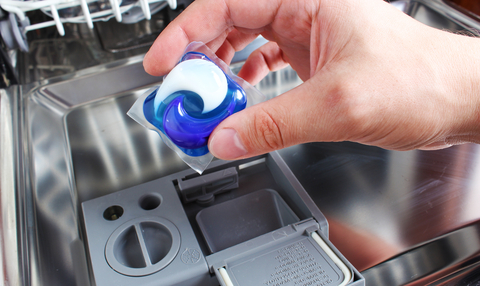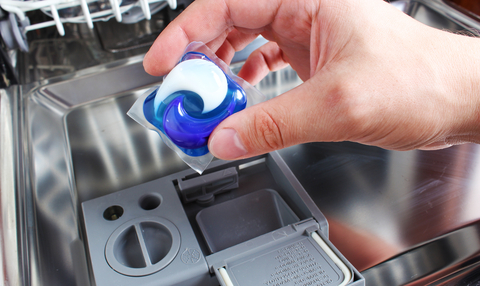WASHINGTON--(BUSINESS WIRE)--The American Cleaning Institute (ACI), the trade association for the U.S. cleaning product supply chain, issued the following statement in response to a petition from non-governmental organizations calling for the Environmental Protection Agency (EPA) to limit the use of polyvinyl alcohol film (also known as PVA or PVOH film) in laundry packets and automatic dishwasher detergent tablets:
BACKGROUND: Liquid detergent packets were introduced globally in the early 2000s and are now used safely and effectively in millions of households every single day. They have grown in popularity because they provide a convenient way to deliver the correct dose of detergent for maximum cleaning efficiency, as well as enable more sustainable innovation. Detergent packets contain highly concentrated cleaning formulas encased in a water-soluble film which is made of PVA/PVOH.
- These films are designed to dissolve completely in washing and dishwashing machines and then flow down the drain with the wash water.
- The films used in detergent packets, along with the ingredients they encapsulate, are safe to use in the home and meet rigorous test methods to ensure they fully dissolve and biodegrade after use.
- The PVOH used in detergent products is accepted by the U.S. EPA Safer Choice program and other strict ecolabeling organizations around the world.
- PVOH is listed on the EPA’s Safer Chemicals Ingredients List.
The design innovations in this format allows for more concentrated formulas to deliver effective cleaning power. The form also uses significantly less water than traditional detergent formats, allowing for less CO2 emission from shipping activities because of the products’ reduced weight and packaging, and they are very effective in washing clothing in cold water temperatures.
Disappointing Misinformation Campaign
Because this chemistry has enabled these innovative laundry and automatic dishwashing product formats, it is extremely disappointing to learn about the misinformation that is being spread about PVA/PVOH.
We believe this recent effort by NGOs to petition the EPA is part of an ongoing marketing campaign funded by a company with an interest in preventing other companies from using this technology. This marketing campaign, which aims to discredit PVOH and the companies that use it, ignores decades of science and research demonstrating the biodegradability of this chemistry.
- A 2021 journal article examined years of research about polyvinyl alcohol based film, with a thorough explanation of film design, test methods and conclusive evidence of biodegradability in the wastewater treatment environment.
- Most recently, a 2022 journal article journal article demonstrated laundry-application grade PVA/PVOH undergoes extensive biodegradation in two commonly used and accepted standard methods. Furthermore, this article supports that microorganisms capable of biodegrading PVA/PVOH are found in treatment plants and in river water.
The publication that these interest groups are relying upon to attack their competition’s products presents a flawed model based on theoretical assumptions and uses flawed data in that model. According to an ACI analysis of research cited by the NGOs, the paper in question:
- Incorrectly states that rapid biodegradation of PVA is ONLY possible within specific conditions, while citing data and literature that confirms the opposite.
- Does not distinguish the types or sources of PVA in wastewater (which may come from non-soluble grades used for other applications in other industries).
- Bases estimates of U.S. wastewater treatment losses from leakage to the environment on data from India, which is incongruent in their attempts to assess PVA use in the United States.
- Uses only worst-case estimates for biodegradation data from grades of PVA that are not designed for use in detergent applications.
- Inaccurately depicts potential water-pollution concerns based on the amount of PVA used in different geographical areas of the U.S.
- Inaccurately states that the microorganisms required to degrade PVA are not found in wastewater treatment facilities, when the tests used by manufacturers that are required to prove biodegradation are conducted using inoculum taken from domestic wastewater facilities.
- Uses inaccurate, self-generated market data that overestimates detergent packet sales by three times based on publicly available data (J. Turk, 2020).
For further ACI resources on PVA/PVOH film technologies, please visit:
https://www.cleaninginstitute.org/pvoh-biodegradability
Publication Summary:
Biodegradability of Polyvinyl Alcohol Based Film Used for Liquid Detergent Capsule:
https://www.cleaninginstitute.org/sites/default/files/documents/PVOHBiodegradabilityWhitePaper7.19.21.pdf
Water soluble polymer biodegradation evaluation using standard and experimental methods
https://www.sciencedirect.com/science/article/pii/S0048969722071066
The American Cleaning Institute® (ACI – www.cleaninginstitute.org) is the Home of the U.S. Cleaning Products Industry® and represents the $60 billion U.S. cleaning product supply chain. ACI members include the manufacturers and formulators of soaps, detergents, and general cleaning products used in household, commercial, industrial and institutional settings; companies that supply ingredients and finished packaging for these products; and chemical distributors. ACI serves the growth and innovation of the U.S. cleaning products industry by advancing the health and quality of life of people and protecting our planet. ACI achieves this through a continuous commitment to sound science and being a credible voice for the cleaning products industry.
Citations
- Tark J. (2020). Liquid Laundry Packets Post-Implementation Period Report Through 2019.
https://cpsc.gov/s3fs-public/Liquid-Laundry-Packets-Post-Implementation-Period-Report-Through-2019.pdf?lKU3Y0iwa26FkqmhDK2vMG9wmyM2k7sM




